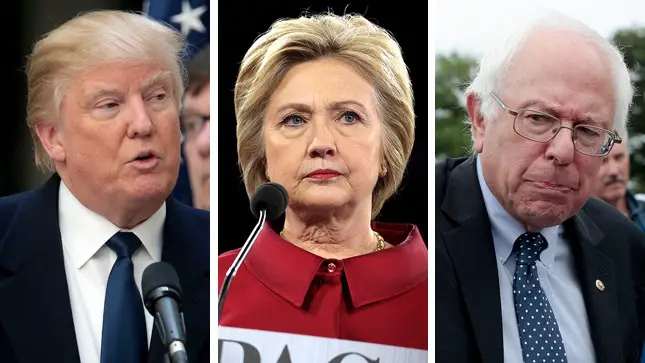Throughout the campaign season, there have been complaints that all the media coverage was on the GOP side—mostly, on Donald Trump. There was also the warning that all that coverage was actually hurting the party. That is, maybe it’s not true that “there’s no such thing as bad publicity,” as P.T. Barnum supposedly said. But now that the Republican challengers have quit, the media have turned to Bernie and Hillary.
And that’s not good for Hillary, according to the New York Times.
Defiant and determined to transform the Democratic Party, Senator Bernie Sanders is opening a two-month phase of his presidential campaign aimed at inflicting a heavy blow on Hillary Clinton in California. . .
While Mr. Sanders says he does not want Mr. Trump to win in November, his advisers and allies say he is willing to do some harm to Mrs. Clinton in the shorter term. . .
Tad Devine, a senior adviser to Mr. Sanders, said the campaign did not think its attacks would help Mr. Trump in the long run, but added that the senator’s team was “not thinking about” the possibility that they could help derail Mrs. Clinton from becoming the first woman elected president. . .
Mr. Sanders has sharpened his language of late, saying Tuesday night that the party faced a choice to remain “dependent on big-money campaign contributions and be a party with limited participation and limited energy” or “welcome into the party people who are prepared to fight for real economic and social change.”
Just weeks ago, Democrats were gleeful at the growing hostility on the GOP side. Both Ted Cruz and John Kasich insisted that they would not quit the race. Both have refused to endorse Trump, and Cruz has been visible in his attempts to control the convention. All of that made Democrats very happy. Until now.
Polls say that the primary season is a disaster for the parties, according to Stanford Research.
“When parties go through divisive primaries in (highly) salient electoral settings, they suffer significant penalties in the general election,” said Andrew B. Hall, an assistant professor of political science at Stanford. . .
In an interview, Hall suggested that while divisive primaries may be bad for parties, they may not be bad for voters and citizens. The research indicates that divisive primaries come with a high level of information and media coverage, which suggests that the voting in such contests is more informed.
But the entire system seems to be frustrating people, according to a recent Pew Research Poll.
[OVERVIEW]
Most registered voters do not think the presidential primaries have been a good way of determining the best-qualified nominees. . .That report also found that neither Republicans nor Democrats have a great deal of confidence in the political wisdom of the American people. . . More than half of white voters say life for “people like them” has gotten worse over the past half-century, while black and Hispanic voters are more positive in these evaluations.[HIGH INTEREST, INCREASED SKEPTICISM]
Fully 85% of registered voters say they have given a lot of thought to the 2016 election. That is not only greater interest than at comparable points in recent campaigns, it is the highest level of interest measured at any point in all elections since 1988.Only 35% of voters say that the primary system is a good way of determining the best qualified nominee. . . Currently, 42% of Republican voters have a positive view of the primary process, compared with 30% of Democrats.
Six-in-ten GOP voters who support Trump for the Republican nomination say the primaries have been a good way of determining the best-qualified nominees. . . Cruz supporters express more positive views of the primaries than do Kasich backers (40% vs. 17%). . . Among Democrats, Clinton supporters are more likely than those who support Sanders. . .(37% vs 25%).
[MEDIA COVERAGE]
Three-quarters (75%) of all registered voters say that news organizations have given too much coverage to Trump. . . About four-in-ten (41%) say Clinton has received too much coverage. . .[LITTLE CONFIDENCE IN VOTING PUBLIC]
Nearly two-thirds (65%) say they have little or no confidence in the public’s political wisdom. . . Since 2007, the shares of both Republicans and Democrats who express at least a good deal of confidence in the public’s political wisdom has fallen sharply. Currently, just 35% of Republican voters and 32% of Democratic voters say they have at least a good deal of confidence in the public’s wisdom in politics, down from 61% and 58%, respectively, nine years ago.[FRUSTRATION, NOT ANGER]
Overall, 35% of Republican voters say they are angry at government; more (58%) describe themselves as frustrated and just 6% say they are basically content with the federal government. . . Just 10% of Democrats say they are angry at government. About six-in-ten Democrats (61%) say they are frustrated with the federal government, while 27% say they are basically content.Half of Trump supporters (50%) say they are angry at the federal government, compared with 30% of Cruz supporters and 18% of Kasich supporters. Even smaller shares of Sanders (13%) and Clinton supporters (6%) express anger at government.
So, to recap, according to these authors, Bernie is more adamant than ever, that will likely hurt Hillary in the general election, the whole system is turning people off, and nobody’s really happy about anything. . .
Donate Now to Support Election Central
- Help defend independent journalism
- Directly support this website and our efforts
